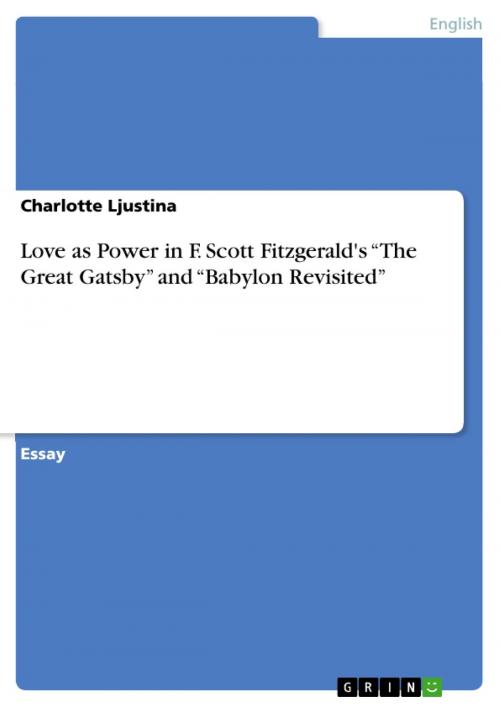Love as Power in F. Scott Fitzgerald's 'The Great Gatsby' and 'Babylon Revisited'
Fiction & Literature, Literary Theory & Criticism, British| Author: | Charlotte Ljustina | ISBN: | 9783668085411 |
| Publisher: | GRIN Verlag | Publication: | November 11, 2015 |
| Imprint: | GRIN Verlag | Language: | English |
| Author: | Charlotte Ljustina |
| ISBN: | 9783668085411 |
| Publisher: | GRIN Verlag |
| Publication: | November 11, 2015 |
| Imprint: | GRIN Verlag |
| Language: | English |
Essay from the year 2014 in the subject English Language and Literature Studies - Literature, grade: A, , course: American Literature III, language: English, abstract: F. Scott Fitzgerald's stories 'The Great Gatsby' and 'Babylon Revisited' challenge standard notions of the term 'love'. From failed marriages to secret mistresses, the concept and expression of love is consistently problematized. Love is consecrated in the act of marriage in these stories and yet it is hardly enough to maintain stable relationships. What does this mean for Fitzgerald's leading ladies? Are they able to manipulate the standard of love to gain autonomy and respect? Fitzgerald's short story Babylon Revisited was published six years after the release of his critically acclaimed novel The Great Gatsby. Known for his autobiographical sketches, Fitzgerald's tales of post World War I fantasticism detail the journey of romantic ideals between man and woman. Both of these publications, alongside their motion picture counterparts, demonstrate that Fitzgerald's presentation of love is not always through the romantic ideals that the emotion endorses. In an era where fantasy and extravagance were the norm, Fitzgerald's demonstration of love transforms the emotion into a physical possession. Love becomes a purchasing power that Fitzgerald's women use to gain autonomy and respect.
Essay from the year 2014 in the subject English Language and Literature Studies - Literature, grade: A, , course: American Literature III, language: English, abstract: F. Scott Fitzgerald's stories 'The Great Gatsby' and 'Babylon Revisited' challenge standard notions of the term 'love'. From failed marriages to secret mistresses, the concept and expression of love is consistently problematized. Love is consecrated in the act of marriage in these stories and yet it is hardly enough to maintain stable relationships. What does this mean for Fitzgerald's leading ladies? Are they able to manipulate the standard of love to gain autonomy and respect? Fitzgerald's short story Babylon Revisited was published six years after the release of his critically acclaimed novel The Great Gatsby. Known for his autobiographical sketches, Fitzgerald's tales of post World War I fantasticism detail the journey of romantic ideals between man and woman. Both of these publications, alongside their motion picture counterparts, demonstrate that Fitzgerald's presentation of love is not always through the romantic ideals that the emotion endorses. In an era where fantasy and extravagance were the norm, Fitzgerald's demonstration of love transforms the emotion into a physical possession. Love becomes a purchasing power that Fitzgerald's women use to gain autonomy and respect.















